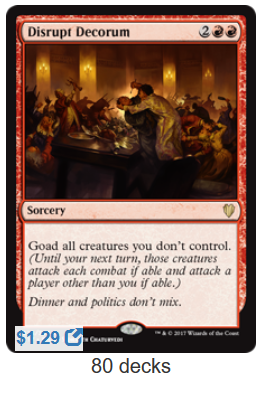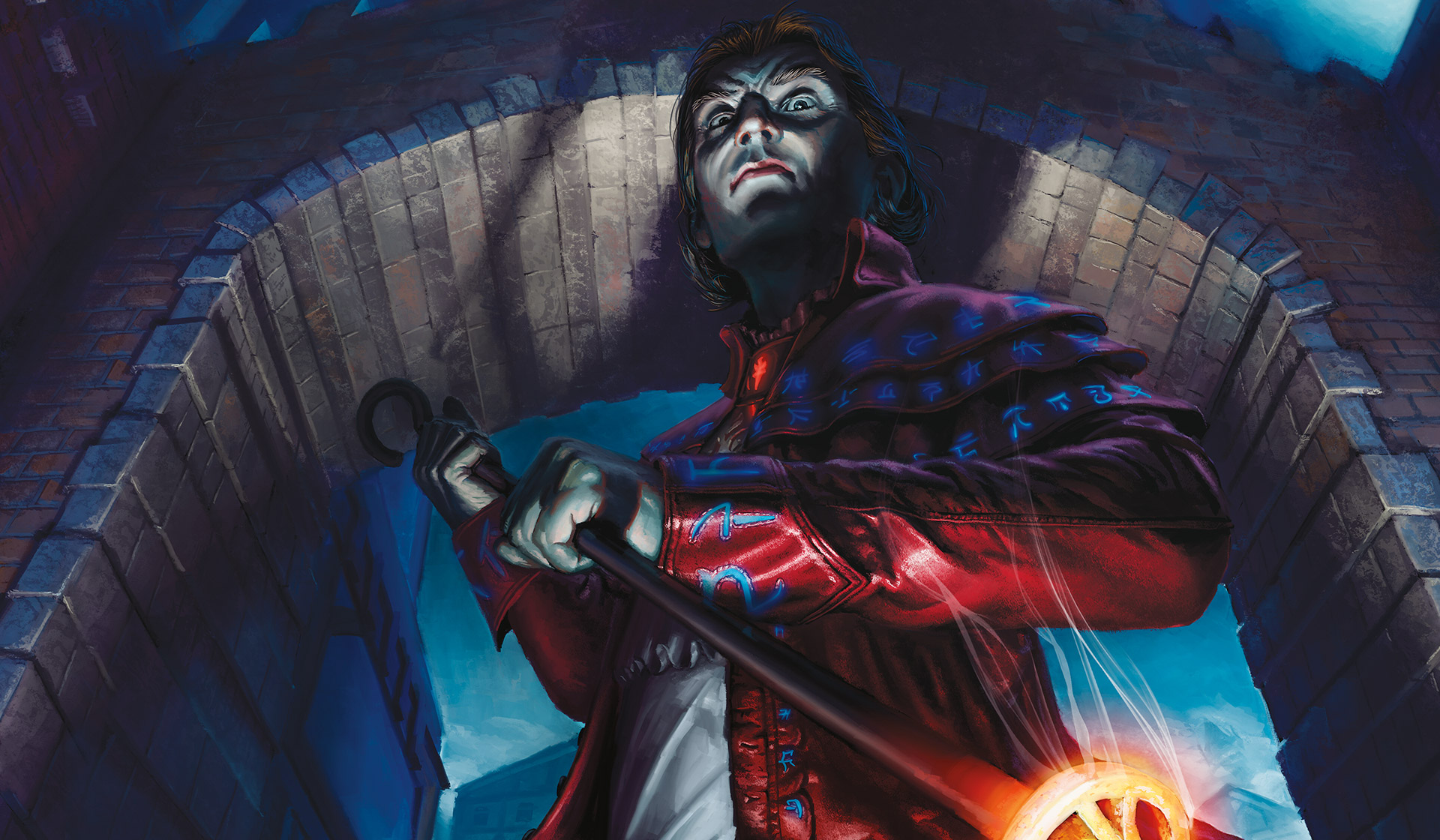The world lived in chaos before 1945. War was the status quo for many places through out history. In the age we have lived in since the end of World War II there have been many quarrels and fights between super powers. Deaths have occurred; however, on a large scale, the world has less violence and death now than ever (if you agree with Stephen Pinker.) I think at least some of this has come from our large-scale cooperation. The creation of the United Nations and the European Union came about as a response to the atrocities of the world wars. Economic and political dependency creates incentives for peace. This is at least part of what makes group hug as an archetype in EDH work. Let's dive into the inner workings of group hug with one of the newest political commanders, Mathas, Fiend SeekerMathas, Fiend Seeker.
"F" is for Friends
Group hug, for those who don't know, is an archetype built around giving all players cards, ramp, and advantage in order to speed up the game while evening the playing field. This can be distorted in many ways. This is especially true in the case of "group slug", which, with cards like Nekusar, the MindrazerNekusar, the Mindrazer creates an ever worsening life or resource drain until everyone dies.


The first principle of group hug is bearing gifts. Those other players at the table want to kill you, but your view is to kill them with kindness. Not literally, we will get to win conditions later. We are arming our enemies in hopes to appease them into not killing you. Logically insane, but practically it works out well enough. With Howling MineHowling Mine and similar effects giving you enough to defend against their threats. If we are building Mathas, Fiend SeekerMathas, Fiend Seeker to bring gifts for others (like with the bounty power) then we need effects like this. Reloading our opponents' hands to take down the next bounty brings us wealth too. Granting nearly symmetrical boons, and punishing those out of control makes Mathas an interesting group hug commander.
Creating friends and not enemies is a tricky line to toe. Consider that your accountability to your opponents is directly related to your ability to help them, minus your ability to kill them. You must be faster than the weakest player but less feared than the strongest player. Your incentives only get you so far in this race. Matching incentives (card draw) with disincentives (bounty targets, prison effects) is essential. Drawing too many or too few of one means an early departure. This simple reasoning exemplifies why many group hug decks play Ghostly PrisonGhostly Prison, but can be achieved similarly with having a strong board presence. Having both is best.
"U" is for You and Me
Once you have the ability to get friends on your side, the next step is keeping the right friends—otherwise known as threat assessment. This is an essential skill to magic but is the reason any one group hug player will thrive or die.
Threat assessment in group hug is part control magic and part political savvy. Group hug plays differently from other decks when dealing with threat assessment, thus you have to understand how to assess threats differently. What I mean by this is that the threats you are facing are in many ways coming at you faster than your answers. You need to consider how the threats can be dealt with by others. Let's dig into the answers you need and then into assessing the threats separately.



Vague statements by politicians have become a cliche these days. For good reason. Vague answers mean keeping your options open even if your outs are low. In EDH we too know of the powers of versatility. Answers in group hug often look like OblationOblation. This is an effect seen in few other archetypes. You don't run this because of the "hugs" for other players, but because it is an amazingly versatile card. Running Mardu, with our commander as Mathas, Fiend SeekerMathas, Fiend Seeker, means we have access to some of the most versatile removal in the game. VindicateVindicate and similar effects are perfect if a little heavy-handed. Your threat and answer density in group hug is lower than any other archetype, because you need so many other cards for ramp, draw, and protection. Every answer needs to count, and open ended answers are the ones you can count on.
Assessing threats is also tied to our low answer count. It is important that Mathas, Fiend SeekerMathas, Fiend Seeker gives others at the table (with more answers and threats) incentive to deal with problems. His bounty power means we have to choose the threats wisely. If we choose to deal with something on one part of the table that we could have had someone else deal with, we are nailing our own coffin. Even the versatile and powerful new Disrupt DecorumDisrupt Decorum can't get you out of the worst situations. The largest threat is likely not who has the best board at the table, but who has the best hand and top decks. When playing politics, communication is key. A bounty counter speaks volumes.
N is for... No Survivors!

Ending the game when piloting group hug can be the most difficult part. Mathas incentivizes others to quarrel among themselves, but there can only be one left (that is why we call it Elder Dragon "HIGHLANDER", right?). You need a way to end everything. My Kynaios and Tiro of MeletisKynaios and Tiro of Meletis deck wins by copying and stealing your opponents biggest threats, with a splash of infinite combos. I also have run Atraxa, Praetors' VoiceAtraxa, Praetors' Voice with ExsanguinateExsanguinate and a mill back up plan to win. I love working with ExsanguinateExsanguinate or FireballFireball effects, and we are in the perfect colors to do it, but there isn't quite the mana ramp I want for that sort of strategy. What is important is something stated earlier, we have a low threat density. We need our threats to bring a game to a halt instantaneously and definitively. Reanimation in our Mathas, Fiend SeekerMathas, Fiend Seeker deck sounds like fun! Not as instantaneous as infinite combos, or life drain, but certainly fun. We can't count on reanimating something amazing from our deck though. We need our card slots filled with group hug cards. Let's pull back from the dead the best of what we just murdered.
F.U.N.
View on ArchidektCommander (1)
- 1 Mathas, Fiend SeekerMathas, Fiend Seeker
Creatures (17)
- 1 Alms CollectorAlms Collector
- 1 Angel of DespairAngel of Despair
- 1 Avatar of WoeAvatar of Woe
- 1 Blood ArtistBlood Artist
- 1 Boldwyr HeavyweightsBoldwyr Heavyweights
- 1 Bounty HunterBounty Hunter
- 1 Chainer, Dementia MasterChainer, Dementia Master
- 1 Dragon MageDragon Mage
- 1 Intrepid HeroIntrepid Hero
- 1 Kazuul, Tyrant of the CliffsKazuul, Tyrant of the Cliffs
- 1 Michiko Konda, Truth SeekerMichiko Konda, Truth Seeker
- 1 Orzhov AdvokistOrzhov Advokist
- 1 Queen MarchesaQueen Marchesa
- 1 Royal AssassinRoyal Assassin
- 1 Sepulchral PrimordialSepulchral Primordial
- 1 Solemn SimulacrumSolemn Simulacrum
- 1 Windborn MuseWindborn Muse
Instants (8)
- 1 Anguished UnmakingAnguished Unmaking
- 1 Chaos WarpChaos Warp
- 1 OblationOblation
- 1 Rakdos CharmRakdos Charm
- 1 Swords to PlowsharesSwords to Plowshares
- 1 Teferi's ProtectionTeferi's Protection
- 1 TerminateTerminate
- 1 Utter EndUtter End
Sorceries (12)
- 1 Austere CommandAustere Command
- 1 Beacon of UnrestBeacon of Unrest
- 1 Blasphemous ActBlasphemous Act
- 1 Council's JudgmentCouncil's Judgment
- 1 Disrupt DecorumDisrupt Decorum
- 1 FumigateFumigate
- 1 Incendiary CommandIncendiary Command
- 1 Merciless EvictionMerciless Eviction
- 1 Reforge the SoulReforge the Soul
- 1 VandalblastVandalblast
- 1 VindicateVindicate
- 1 Wheel of FortuneWheel of Fortune
Artifacts (16)
- 1 Boros SignetBoros Signet
- 1 Chromatic LanternChromatic Lantern
- 1 Commander's SphereCommander's Sphere
- 1 CrawlspaceCrawlspace
- 1 Font of MythosFont of Mythos
- 1 Ghirapur OrreryGhirapur Orrery
- 1 Howling MineHowling Mine
- 1 Lightning GreavesLightning Greaves
- 1 Norn's AnnexNorn's Annex
- 1 Orzhov SignetOrzhov Signet
- 1 Rakdos SignetRakdos Signet
- 1 Sol RingSol Ring
- 1 Strionic ResonatorStrionic Resonator
- 1 Swiftfoot BootsSwiftfoot Boots
- 1 Temple BellTemple Bell
- 1 Mirage MirrorMirage Mirror
Enchantments (9)
- 1 Blind ObedienceBlind Obedience
- 1 Curse of DisturbanceCurse of Disturbance
- 1 Curse of OpulenceCurse of Opulence
- 1 Curse of Shallow GravesCurse of Shallow Graves
- 1 Debtors' KnellDebtors' Knell
- 1 Ghostly PrisonGhostly Prison
- 1 Mana FlareMana Flare
- 1 Phyrexian ArenaPhyrexian Arena
- 1 Sphere of SafetySphere of Safety
Lands (37)
- 1 Blood CryptBlood Crypt
- 1 Bojuka BogBojuka Bog
- 1 Cabal CoffersCabal Coffers
- 1 Clifftop RetreatClifftop Retreat
- 1 Command TowerCommand Tower
- 1 Dragonskull SummitDragonskull Summit
- 1 Evolving WildsEvolving Wilds
- 1 Godless ShrineGodless Shrine
- 1 Isolated ChapelIsolated Chapel
- 1 Nomad OutpostNomad Outpost
- 1 Path of AncestryPath of Ancestry
- 1 Sacred FoundrySacred Foundry
- 1 Temple of MaliceTemple of Malice
- 1 Temple of SilenceTemple of Silence
- 1 Temple of TriumphTemple of Triumph
- 1 Terramorphic ExpanseTerramorphic Expanse
- 1 Urborg, Tomb of YawgmothUrborg, Tomb of Yawgmoth
- 9 PlainsPlains
- 8 SwampSwamp
- 3 MountainMountain
The sorts of reanimate spells I put in the deck are more focused on other players graveyards. Since we are already putting a bounty on the biggest, juiciest targets, why not bring them back to work for us? This lets me use one of my favorite cards from when I was starting out, Debtors' KnellDebtors' Knell. It's really slow and win-more, but it brings my younger "Timmy" sensibilities much joy!
One Last Squeeze
This type of group hug is much closer to aggressive than I normally like, but Mathas, Fiend SeekerMathas, Fiend Seeker is such a fun political commander that I couldn't pass up the chance to build with this guy. I hope you had as much fun building with hugs and thugs as I did. Please let me know if you think playing this build with infinite combos is the way to go, or if you think of some other win condition that is best to use. I would love to hear suggestions for upcoming articles on politics in EDH or real life. Thanks for reading!
Rick Amundson
Rick is a professional bookseller, writer and gamer. He could be battling international trade atrocities with his Bachelors Degree in International Studies, but he would rather be playing games of magic, running game night at the bookstore, playing an insidious dungeon master at a convention, or talking and writing about any of the above.
Your opinions are welcome. We love hearing what you think about Magic! We ask that you are always respectful when commenting. Please keep in mind how your comments could be interpreted by others. Personal attacks on our writers or other commenters will not be tolerated. Your comments may be removed if your language could be interpreted as aggressive or disrespectful. You may also be banned from writing further comments.
